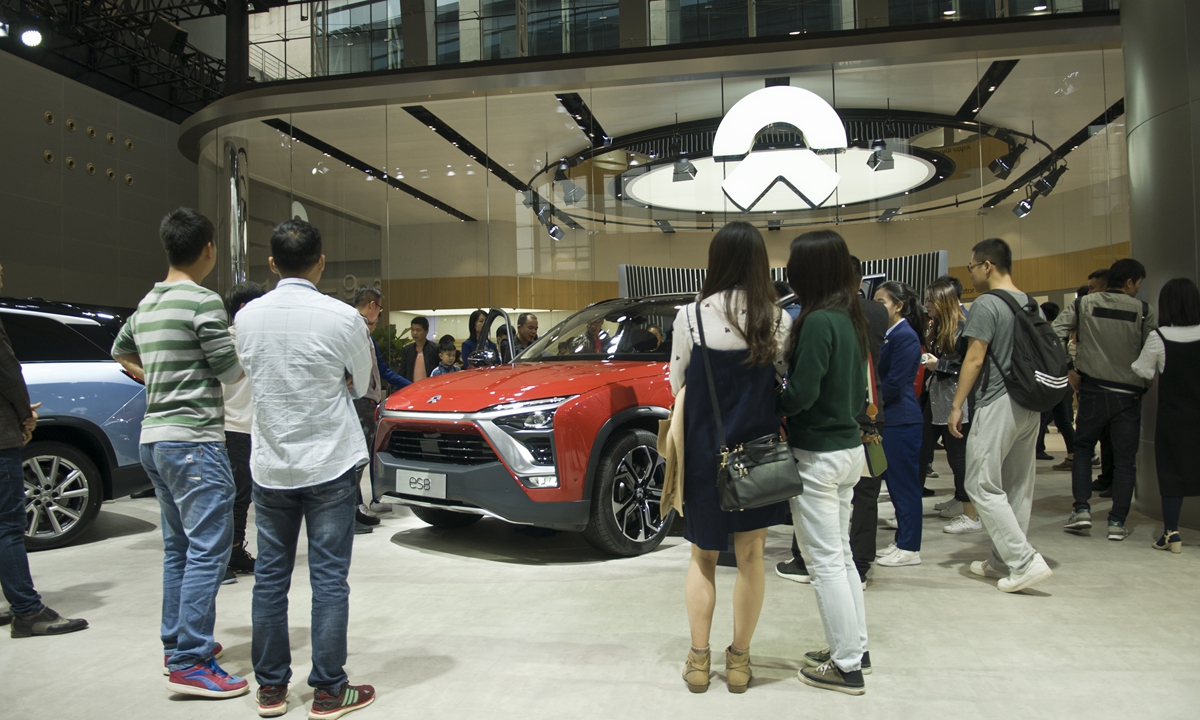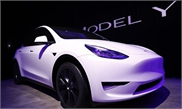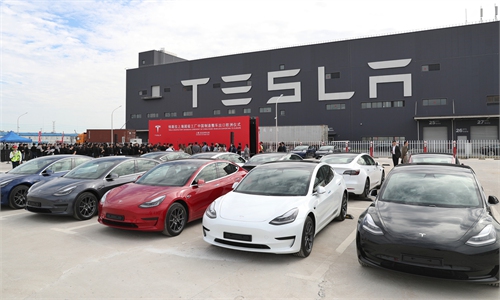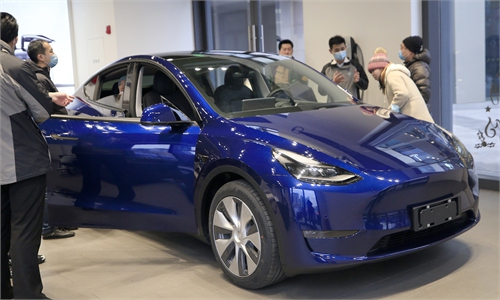Chinese EV brands need to rev up efforts in quick-changing competition: analyst
New energy cars to see an explosion: analyst

Customers look at a NIO ES8 new energy vehicle at a store in July, 2018. Photo: IC
On the cusp of an explosion of new energy development in China and globally to replace carbon emissions from fossil fuel, new energy vehicles are increasingly becoming market-oriented to meet consumer needs, and at the same time, competition among major NEV players will only become fiercer in 2021.
Traditional domestic auto brands are expected to make their all-out efforts in the next two years to sharpen their technology and roll out a wide variety of new products that will compete with one another, in a brutal race where all players, including leading US NEV giant Tesla, the trio of Chinese upstart electric automakers - Nio, XPeng and Li Auto, as well as conventional carmakers such as Volkswagen and BMW.
These manufacturers are trying to grasp a larger market share in the world's largest NEV market, analysts say.
The dawn of the NEV dominance in auto market is irreversible, and the players will only rev up their drive in the Chinese market, where they must have a firm foothold if they want to become global electric car giants.
On Saturday, Nio Inc. launched its first self-driving model, the smart electric flagship sedan ET7, attracting market attention for making use of a slew of state-of-the-art technologies.
At the company's annual "NIO Day" held in Chengdu, capital of Southwest China's Sichuan Province, Nio President and CEO William Li said the luxury ET7 sedan, starting at 448,000 yuan ($69,170) before subsidies, would be a "cozy living room" with new autonomous-driving capabilities and features seats with inbuilt massage functions.
The car adopts Qualcomm's third-generation automotive digital cockpit platform and carries connectivity capabilities as 5G, Wi-Fi 6, Bluetooth 5.2 and ultra-wideband. On the car's top, a lidar - short for laser-based radar - will widen drivers' visual field.
Li also unveiled several new technologies, including a more powerful 150 kilowatt-hour battery pack, which is reported to enable the EV model to run more than 1,000 kilometers on a single full charge.
Deliveries of ET7 are set to begin in the first quarter of 2022.
"People around me have shown increasing interest in the new sedan who have placed preorders," Feng Shiming, a Shanghai-based auto industry analyst, told the Global Times on Sunday.
"ET7 can be deemed as a new template of car intelligence and the product showcased that a Chinese EV brand can achieve high quality with a high price too, as foreign brands do," Feng said.
Rising market competition
"We are seeing a significant movement toward electrification from Volkswagen. And a lot of the Chinese companies are very, very, very fast. I would guess the most competitive company for Tesla might be a company that was created in China. The market there is extremely competitive. They have some very good companies, and they work super hard," Telsa CEO Elon Musk said in a recent interview with Mathias Döpfner, the CEO of Business Insider's parent company Axel Springer.
The launch of Nio's new sedan appears to rival Tesla's Model Y sport-utility vehicle (SUV), which commenced sales in the Chinese market earlier this month, when a surprising price cut was announced, sparking wild interest of Chinese consumers who rushed to Tesla stores to try the new car and place orders.
Compared with Tesla's price-cutting strategy aiming to expand sales in the Chinese market, Nio maintained its brand pedigree. "Actually, what we can see is their diverging routes different car brands have chosen. They have different focuses on their products at the moment," Feng noted.
Last year, Nio's model was priced at more than 400,000 yuan per unit on average, compared with Tesla's 300,000 yuan.
The Chinese car start-up has repeatedly said that the price range that Nio desires is reaching price level of fossil fuel cars made by luxury brands such as BMW, Benz and Audi (usually referred to as BBA in China), meanwhile providing products and services that are more competitive.
"Tesla has already started winning some customers who would originally want to pick a BBA car, eating into their market share, in this regard, the trio of local champions have not yet reached this level," said Yale Zhang, head of Shanghai-based consultancy Automotive Foresight.
Model 3 overtook BMW's 3 Series and Audi's A4 to become the bestselling luxury B-class sedan in November 2020.
For 2020, Nio said its deliveries more than doubled from a year ago to 43,728 vehicles. The US-listed EV firm has a market capitalization of $92 billion at Friday's closing, second only to Shenzhen-based BYD among all Chinese automakers.
If 2020 was marked by the stellar growth of Tesla's Model 3 vehicles and its efforts to ramp up local production in its Shanghai Gigafactory, this year will likely see Tesla stand out with its Model Y, although the latter would find less momentum in the market.
"There was no such type of car as the Model 3 before its rollout in China, so its growth is like from zero to one. But for the Model Y, it has to face some internal competition with its sister model in terms of sales," Feng said, adding that some Chinese car buyers might also want to wait for the delivery of Nio's ET7 next year.
Feng estimated that Tesla's total vehicles sale in China will hit 130,000 units in 2020, and the Chinese market is likely to become the No.1 market for Tesla's sales in 2021, on the condition that no "black swan" event erupts.
Data from the China Passenger Car Association showed that in November, 33,094 units of Hongguang Mini EV were sold, compared with 21,604 units of the Model 3. BYD secured the second spot with total sales of 26,015 units. The top three automakers took up nearly half NEV sales in the country.
Faced with rising competition, it has become increasingly significant for domestic NEV manufactuers to catch up. "Conventional EV makers had heavily relied on the nation's subsidies to make profits, instead of putting their hearts into the research and development of technology and products in the past few years," Zhang said,.
The quick growth of Tesla car sales in China, as well as the growth of EV start-ups like Nio, should serve as a wake-up call for them to reflect and advance, he noted, adding that it's still not too late. "Two years of earnest efforts are enough for the catch-up."





